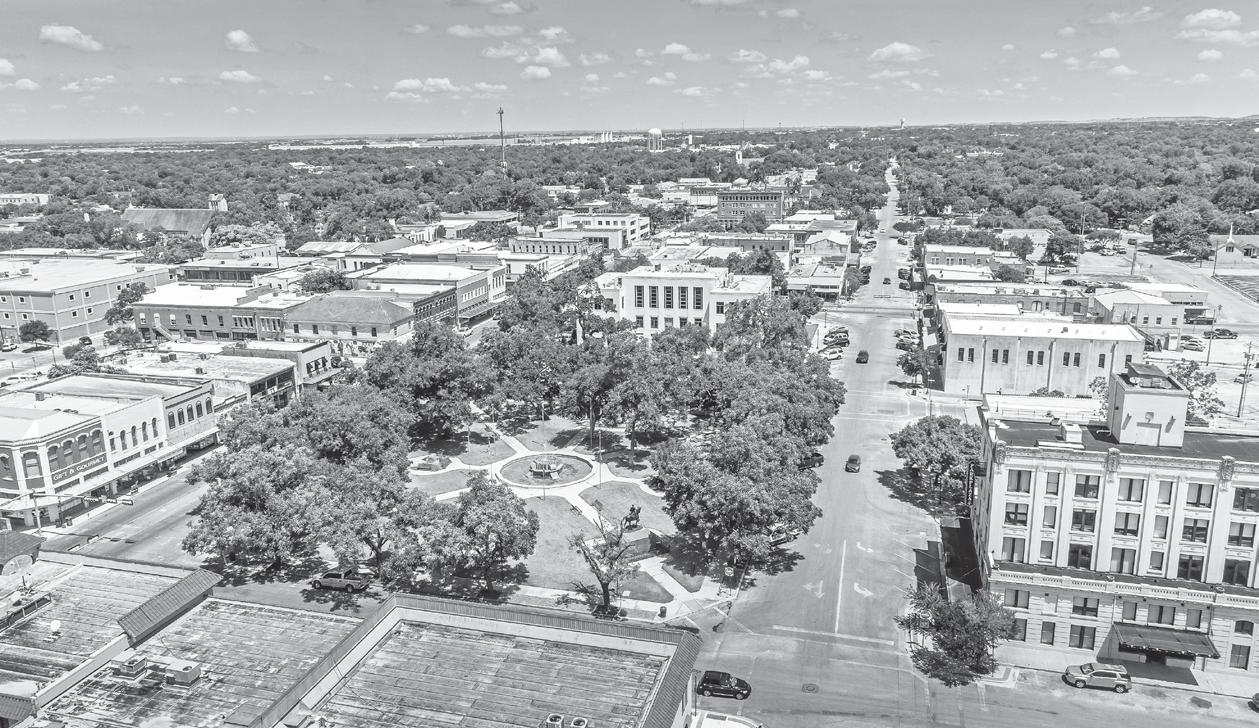
4 minute read
A HISTORY OF FLOYD MCKEE
Seguin with Floyd McKee
STORY AND PHOTOS BY DALONDO MOULTRIE
It might be easy to think you and your history are no big deal when you’ve grown up around people who have streets named after them and members of your own family founded the town you call home.
So getting history buff and published author Floyd McKee to open up about his life and accomplishments isn’t easy. He continually stresses that he and the things he’s seen are no big deal.
“Growing up, a lot of my relatives were here in Seguin or helped establish Seguin,” McKee said. “A lot of my friends’ parents and folks talked.”
That talk struck up an affinity for history. He heard so many stories that reliving the past became a pastime for the Seguin native.
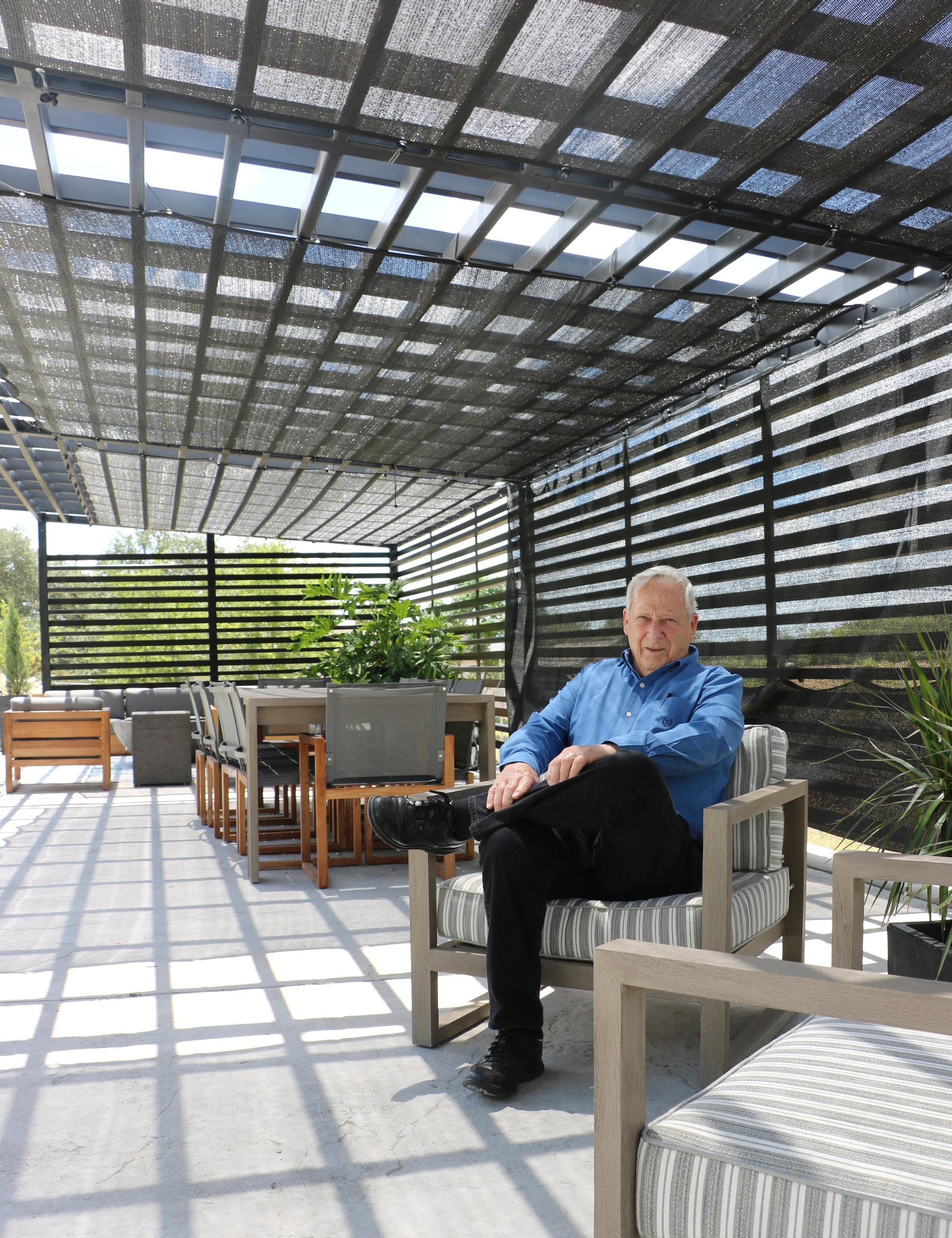
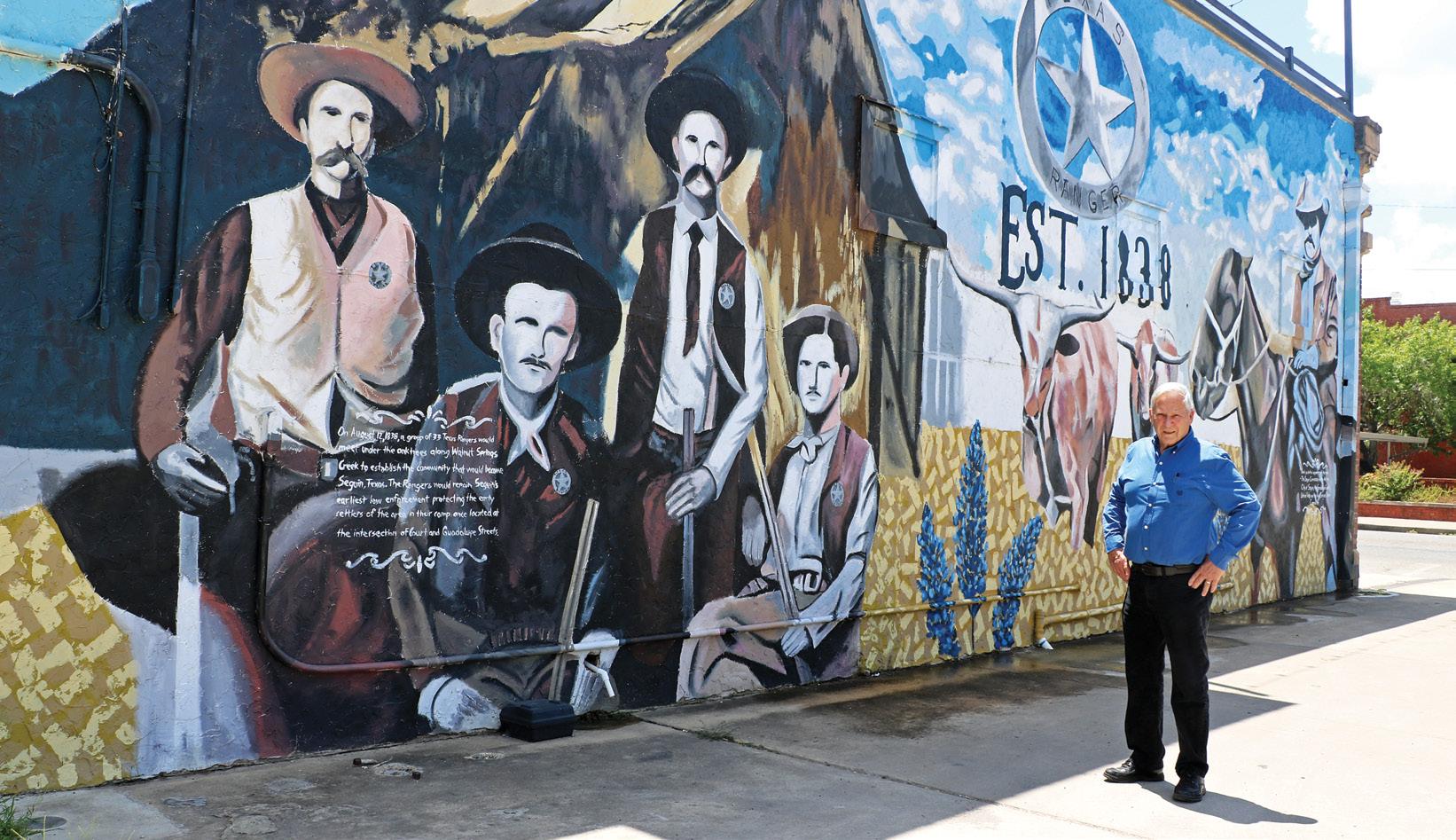
McKee, a descendant of the original Texas Rangers who helped found Seguin, stands in front of a mural painted to commemorate the Rangers in town.
Eight of the original 33 Texas Rangers that organized Walnut Springs and Seguin are his ancestors. Even more members of his family settled in the area around 1840, solidifying his close ancestral ties to the city and the area.
“Five of my ancestors were at (the battle of) San Jacinto (in 1836) and two distant … relatives died in the Alamo,” McKee recalled. “James H. Callahan, my uncle, was a survivor of the Goliad Massacre.
“While growing up, I never associated the names of streets and buildings with some of my ancestors, and the names of people I knew and grew up with had streets named after their ancestors.”
He has spent much of his life in Seguin. Like many young folks his age, he participated in high school sports and played fullback for the Seguin Matadors as a teen.
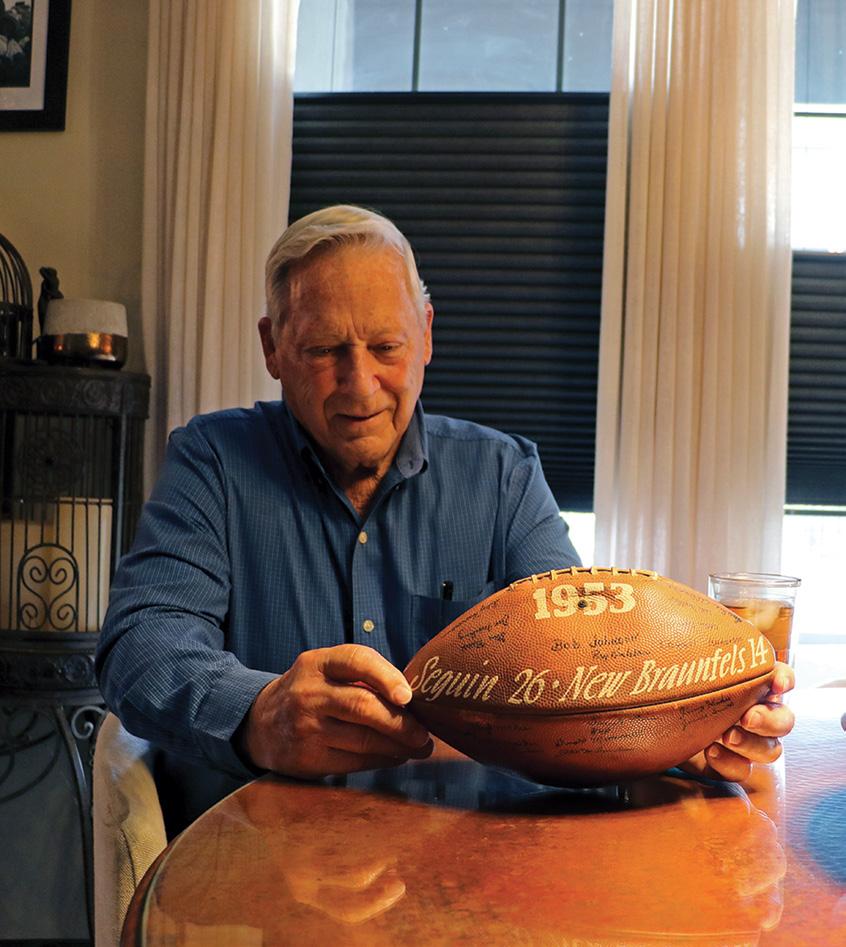
McKee shows off winning game ball from a high school football game more than half a century ago.
McKee’s wife, Jody, recently came across a memento from her husband’s days of glory on the gridiron and had to have it for him.
She was at the Timmermann sisters’ estate sale when she came across an old game ball from the Mats’ 1953 victory over fierce foe New Braunfels High School. Floyd’s signature on the side of the ball brings back fond memories.
“I remember each touchdown the Jody McKee shows off a photo inside the Seguin home she and husband Floyd share. The photo is an image of the first Texas Ranger station constructed in Seguin. crowd was going wild because we were ahead of New Braunfels,” he said. “At that time, they were our arch rival.”
He moved away after high school to attend college at Southwest Texas State University in San Marcos — now known at Texas State University — where he majored in history and earned a bachelor’s degree in education.
After receiving the bachelor’s, flying jets seemed like a good job choice, Floyd said, so he joined the United States Air Force and got his pilot training at Moody Air Force Base in Valdosta, Georgia, training on F-100 fighter jets, the first fighters to fly at supersonic speeds in level flight.
“I could never get it to fly that fast,” Floyd admitted.
During his time in the Air Force, he saw combat during the Vietnam War, for which he received the Bronze Star Medal.
After leaving Vietnam, he was stationed at Headquarters European Command in Stuttgart, Germany, where his boss was Gen. George Patton II, son of World War II’s Gen. George Patton. There the younger Patton ordered Floyd to write a 25-minute speech for famed Gen. Alexander Haig to deliver at the Stuttgart German Chamber of Commerce, Floyd said.
“Unfortunately, he liked the speech and over the next year, I had to write seven more speeches,” the Seguinite said. “Very long year.”
Eventually he retired as a colonel and had been away from Seguin nearly 30 years before making it back home.
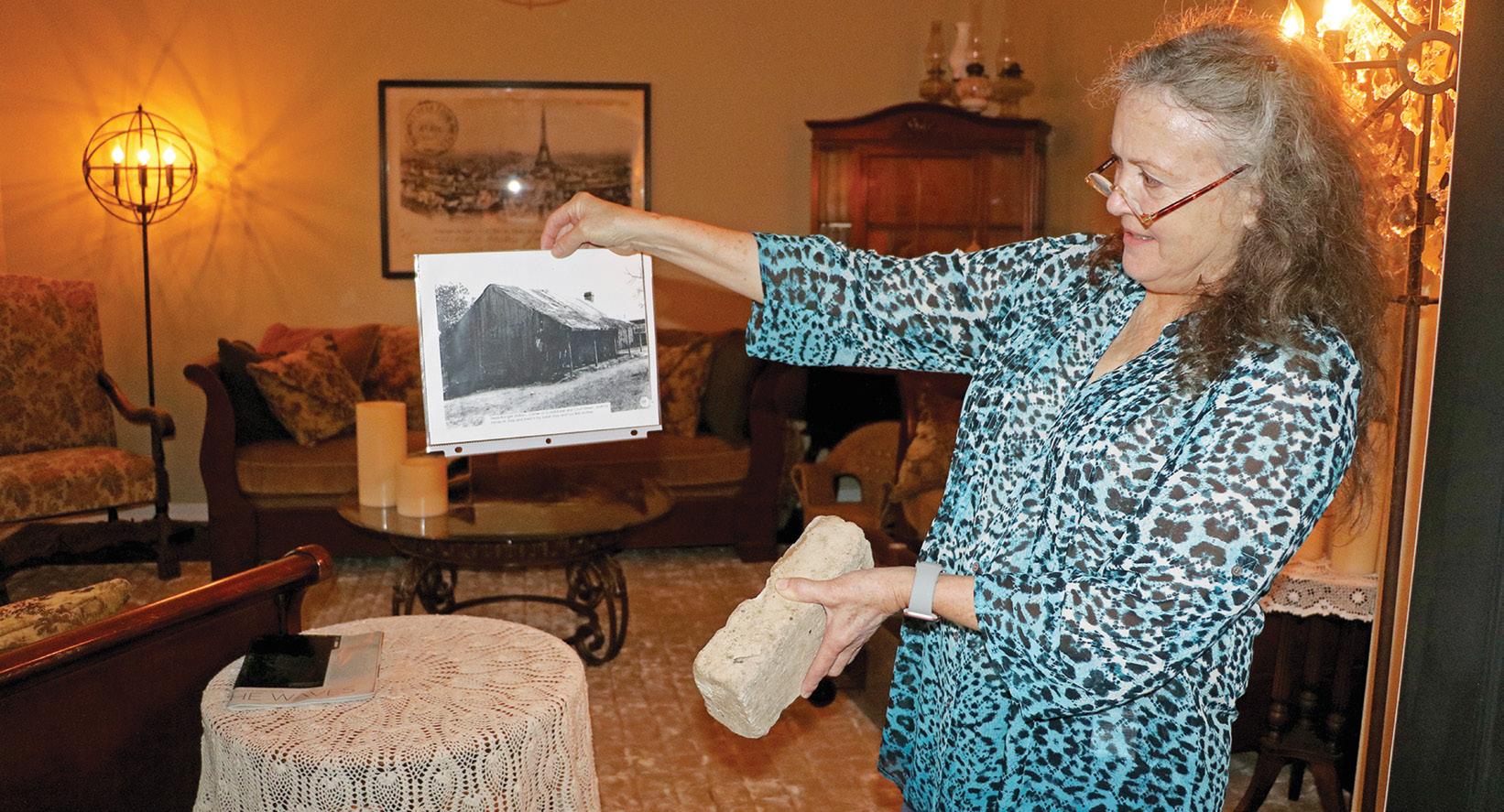
Jody McKee shows off a photo inside the Seguin home she and husband Floyd share. The photo is an image of the first Texas Ranger station constructed in Seguin.
Around 1991, his adult son convinced him to talk to the nice lady Floyd had known about a year.
They went out and hit it off. And when he says they hit it off, he means they really hit off.
“We had a date on Sunday and got married on Thursday,” Jody said of the whirlwind romance.
The McKees, 29 years later, still don’t think the brief engagement was rash at all. They felt completely at ease with each other and obviously made the right decision.
“They had a rule you had to wait three days but the judge in New Braunfels looked at us and said, ‘You look like you’ll be fine,” Jody said. “He waived the rule.”
And the rest is history.
Not long ago, Floyd was at a meeting telling people about some of the history he offhandedly knew about Seguin. The publisher of the Seguin Gazette was at the same meeting, overheard Floyd’s story and thought it could make an interesting guest column in the paper.
Readers ate up the story and were clamoring for more, which prompted former Seguin Gazette Publisher Jeff Fowler to ask Floyd for another and then another.
Eventually, Fowler went to Floyd and just said he would write a weekly column and, again, the rest is history. Since then, Floyd McKee’s “Snapshots of Seguin History” column has appeared, for the most part, each Sunday in the newspaper.
“I got tricked into doing that,” Floyd said. “I said ‘I’ll do it for a while.’ Gosh, that’s five years (ago) now.”
He has turned the historical columns into a book and continues to write more columns for the paper. After all, history is his thing.




